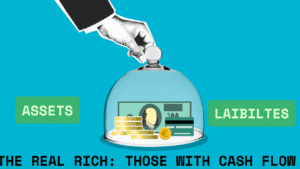Understanding the Asset Rich, Cash Poor Trap: A Financial Wake-Up Call

Assets are scarce… and they don’t always meet your needs.
Even if you own enough assets to last for generations, what good are they if you have no money when a need arises? Many people today are constantly searching for loans despite holding significant wealth. This is because they do not truly understand what real assets are.
In financial terms, this situation is called “asset rich, cash poor.” If you’ve heard this phrase, you already have a clue about the importance of balancing asset classes. You may have land, property, or gold, but if you don’t have cash on hand, you’re stuck when an emergency hits.
Understanding the Asset Rich: What Truly Counts?
So, Understanding the Asset Rich ?
Education is a real asset. It cannot be stolen. It multiplies when shared. Its value doesn’t decline with time—it grows. In contrast, most physical assets either depreciate or become inaccessible during a crisis.
Yes, real estate tends to increase in value over time, and you might say, “But property is always a good investment!” That’s true, but there’s a reason people still say, “If you sell it, it’s a forest. If you buy it, it’s a fire.”
Accumulating real estate is a smart move, but only to a point. If you convert everything you earn into property, you might find yourself land-rich but helpless during a crisis.
Property Owner ≠ Rich Person
There’s a big difference between owning assets and having financial freedom.
You might own:
-
Three acres of mango groves at the edge of a village.
-
A plot on the outskirts of a city.
But even if you mortgage these properties, it may still be impossible to raise ₹1,00,000 for an urgent need. This is where liquid assets—money in hand or in easily accessible forms—become crucial.

The Real Rich: Those With Cash Flow
Financial experts are clear: the truly wealthy are those who have cash in hand when needed. No matter how much land or property you have, if you’re running around looking for loans, you’re in trouble.
And what’s the use of all your assets if you have to beg someone (“dehi“) for help in times of need?
Many people follow the standard path—saving money, buying land or houses, thinking, “This plot is for my daughter’s wedding,” or “That field is for her future medical needs.” But when the time comes:

-
The property might not sell.
-
A buyer may not pay market price.
-
Legal issues could delay or block the sale.
-
The cash might not transfer on time.
What’s worse? You may end up begging a buyer, accepting half the market value just to meet the deadline. The emotional and financial strain can be overwhelming.
Income-Yielding Assets: Think Smart
If you think differently—beyond routine thinking—you can turn your income into multi-purpose financial assets.
✅ Buy real estate—but choose properties that generate income, like:
-
Residential rentals (monthly rent).
-
Commercial shops (steady returns).
-
Farmland that produces seasonal income.
✅ Invest part of your income in:
-
Mutual funds (can be liquidated gradually).
-
Fixed deposits (for emergency-ready funds).
The key is to plan liquidity before you need it. Don’t wait for the last minute. Anticipate the need and act early. That’s how you stay not just asset rich, but also cash rich.
Plan 3 Years in Advance, Not 3 Months

If you rely on assets during emergencies, you’re likely to lose money. For instance, if you decide to sell land two months before your daughter’s wedding, you may not find the right buyer—or price.
Instead, start your preparations three years in advance. Sell when the market is right. Park the proceeds in a fixed deposit or liquid instrument. That way, when the day comes, you’ll have cash in your account within hours, not paperwork dragging on for weeks.
Final Thought
Don’t fall into the trap of being asset rich, cash poor. Real financial strength lies not just in what you own, but in what you can access immediately. Balance your real estate investments with liquid and income-generating assets. Plan well in advance. And make sure your wealth works for your needs—not just for status.
Look at the returns, Guru..
Investing in gold will bring good profits in the long run. Suppose you bought five tola of gold a few years ago! Even then, there was an unexpected change in the price. But, what if we ignore the long period of a few years? According to financial statistics, the returns on gold in the long run do not exceed eight percent. Think about who benefits if you buy pure gold for such a low margin and store it in a bank? During the same period, mutual funds investments are providing returns of up to 18 percent in the long run. We remember the increase in the price of gold. We do not notice the decrease. There is no big difference in the price of gold between 1995 and 2003. Do not forget that it gave negative returns for eight years. The price of gold has risen significantly recently! There is no guarantee that this will continue. It is not about looking at the price increase.. but the percentage of returns in the long run. If you want to invest in gold.. then buying it in the form of ornaments seems to be the best way. Suppose you buy biscuit gold! Remember that banks do not give loans on biscuit gold except for ornaments. Suppose you have worked very hard and bought biscuit gold at the rate of one tola every year for your daughter’s wedding. Some emergency has arisen! If you take those biscuits to the bank.. they tell you to make jewelry and bring it. If you have bought an ornament every year from then on.. then there will be no problem! If the price of gold increases, you are happy! Even if it does not increase, there is an object. We experience it and enjoy it. If it is an object, there is no pain of losing it. There is emotional satisfaction, right?
✨ About Me
Hi! I’m Manikanta Reddy, a passionate finance enthusiast with a strong understanding of money management, personal finance, and smart investment strategies. I believe financial literacy is the foundation of a secure and stress-free life — and I’m here to share practical insights, real-life examples, and simplified advice to help you make better financial decisions.
Whether it’s choosing between paying off a loan or investing, building emergency funds, or planning for retirement — I love breaking down complex topics into easy, actionable tips that anyone can follow.
Let’s learn, grow, and build wealth — the smart way. 💰






1 thought on “Understanding the Asset Rich, Cash Poor Trap: A Financial Wake-Up Call”